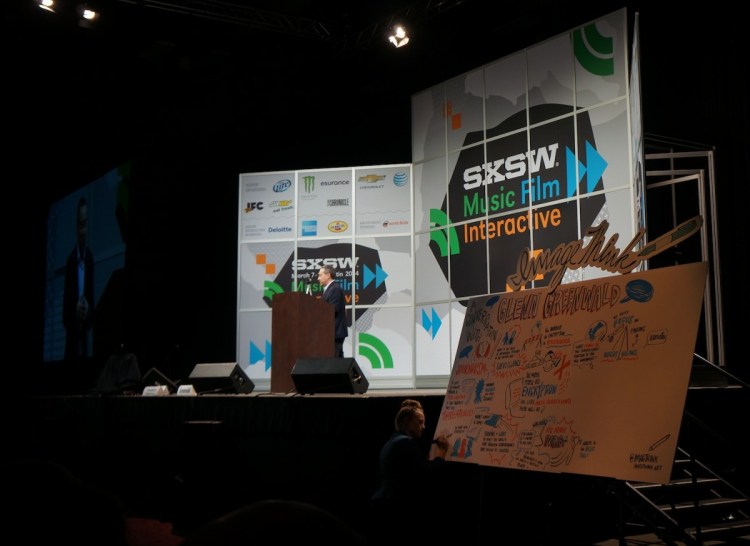AUSTIN, Texas — Glenn Greenwald, editor of the newly launched digital publication The Intercept, told attendees at SXSWi that the National Security Agency is wary of anyone who takes steps to protect their online activity from being hacked, such as using encryption tools.
“In [the NSA’s] mind, if you want to hide what you’re saying from them, it must mean that what you’re saying is a bad thing,” Greenwald said via a Skype video call. “They view the use of encryption… as evidence that you’re suspicious and can actually target you if you use it.”
Greenwald is one of three journalists who activist Edward Snowden entrusted with access to his entire trove of classified documents about the NSA’s surveillance program. During the past year, Greenwald has been dissecting this massive pile of information, adding context and piecing together reports on the NSA’s more questionable surveillance activities. The results have been published in a string of bombshell articles by Greenwald, first in the Guardian and now in The Intercept. Given his access to these documents, Greenwald has a deeper understanding than most of how the NSA operates.
Greenwald’s extensive knowledge of the NSA makes what he’s saying all the more concerning.
During the panel, Greenwald said the NSA is able to target encrypted communications because so few people actually use encryption tools. That makes the people who are actually trying to stay secure stick out like sore thumbs, thus making it much easier for the agency to focus its efforts on hacking the relatively small bits of encrypted data that they intercept.
“I do think individuals have the principal obligation to protect their data,” Greenwald said, likening that responsibility to that of lawyers who protect their clients or journalists who protect their sources. But, he said, the biggest reason to begin using encryption is to make it far more difficult for the government to gain access to your data without going through the proper channels — such as legal warrants, wiretap orders, or subpoenas.
And it’s not just the NSA that Greenwald blames for the overly invasive surveillance.
“The national security state in Washington has so completely perfected the art of co-opting and capturing whatever safeguards are created, that they’re very adept at turning them into further tools for their own power rather than what they’re intended to be,” he said.
The best example of this co-opting, Greenwald said, is with the heads of congressional intelligence committees. “Very quickly, the people in those [intelligence agency] communities figured out how to install slavish loyalists as the heads of those committees so that those committees failed at their designed function to exercise oversight. …
“So you have the heads of these committees in the House and Senate — Mike Rogers (R-Mich.) and Dianne Feinstein (D-Calif.) — that are the leading apologists for the NSA and who wake up every day to think about ways to trick Americans into believing that there’s going to be a reform, when in reality it’s just going to be designed to strengthen the NSA,” Greenwald said.
One cause for concern is that the crowd who turned up to hear Greenwald at SXSW was a mere fraction of the size of the crowd that had gathered just hours before to hear Snowden himself address the public (also via Skype) for the first time since being exiled from the U.S. In other words, lots of people want to hear about government surveillance; not so many are interested in hearing about how to stop it or slow it down.
Obviously, the topic of encrypting ones’ data isn’t nearly as important as it should be. Greenwald said earlier in his discussion that this probably has something to do with the perception that using encryption tools are difficult.
“The barrier most people have when it comes to encryption is more psychological than anything else,” he said.
Recalling a conversation with Snowden about installing encryption tools to communicate, Greenwald said initially he blew Snowden’s suggestion off because he didn’t see the value in it.
“I read the things he was saying and my reaction was, ‘Wow, this is incredibly complex. This is like some difficult outer planet bird language that will take me weeks to master,'” he said.
“And once I actually did it I realized how incredibly easy it is.”
But even though Greenwald doesn’t think U.S. citizens can count on elected officials to help streamline the need for encryption, that doesn’t mean nothing can be done to boost adoption.
“There are definitely strides that the tech community needs to make those tools even more user friendly,” Greenwald said.
VentureBeat's mission is to be a digital town square for technical decision-makers to gain knowledge about transformative enterprise technology and transact. Learn More






![Reblog this post [with Zemanta]](http://img.zemanta.com/reblog_e.png?x-id=96b3b261-3a9c-461c-8613-a615aa3f18c5)
